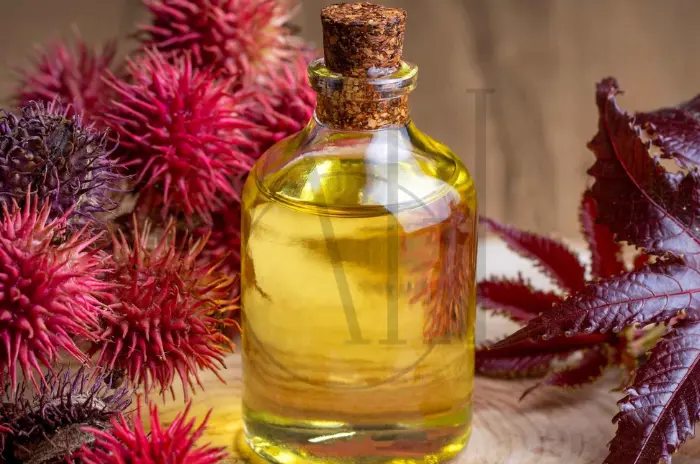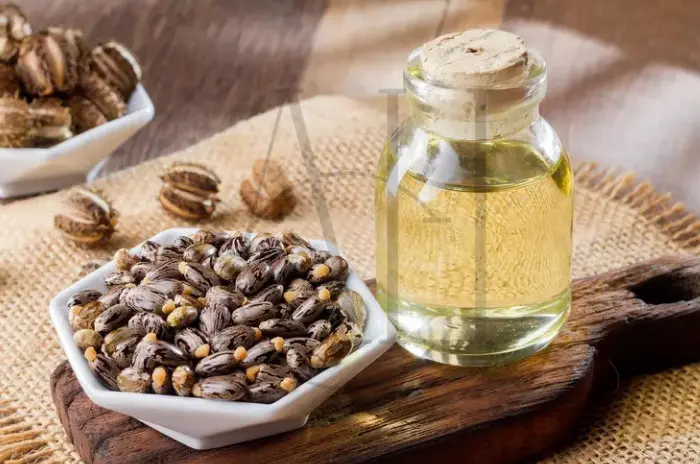Castor oil has been used for centuries in traditional beauty routines, and today it’s gaining renewed attention as a natural remedy for hair concerns. Many people turn to castor oil for hair hoping to achieve thicker, longer, and healthier locks. But does this thick, golden oil truly deliver on its promises?
This guide explores everything you need to know about castor oil hair growth, from its composition and potential benefits to safe application methods and possible side effects. Whether you’re dealing with thinning hair or simply want to improve your hair’s overall health, understanding how castor oil works can help you make informed decisions.
Table of Contents
ToggleWhat castor oil is and how it’s used for hair growth
Castor oil is a vegetable oil extracted from the seeds of the Ricinus communis plant, commonly known as the castor bean plant. This thick, pale yellow liquid has been valued for centuries in traditional medicine and cosmetic applications. The oil’s unique composition makes it particularly interesting for hair care purposes.
The primary component of castor oil is ricinoleic acid, a fatty acid that comprises approximately 90% of the oil’s content. This rare fatty acid is responsible for many of the oil’s distinctive properties, including its high viscosity of castor oil hair treatments often mention. The oil also contains beneficial fatty acids, vitamin E, and minerals.
Traditional and modern applications
Historically, castor oil has been used across various cultures for multiple purposes. In hair care, the oil has long been applied to the scalp and strands with the belief that it promotes hair growth and improves overall hair health. Modern beauty enthusiasts often use it as a weekly treatment, mixing it with lighter oils or applying it directly.
The viscosity of castor oil hair applications require makes it quite different from lighter oils. Its thick consistency means it coats the hair follicles and scalp thoroughly, but also requires more effort to wash out. Many people apply castor oil before bedtime, covering their hair with a shower cap, then washing it out in the morning.
There are several varieties of castor oil on the market, with Jamaican black castor oil and cold-pressed castor oil being the most popular. Cold-pressed versions retain more nutrients because they’re extracted without heat. Both types are commonly used for castor oil treatment routines.
Key benefits of castor oil for scalp and hair health
Castor oil benefits for hair extend beyond the often-discussed growth claims. The oil offers several advantages for maintaining a healthy scalp and improving hair condition. Understanding these benefits can help set realistic expectations about castor oil for hair.
Moisturizing properties for dry scalp
One of the most reliable benefits of castor oil is its excellent moisturizing capability. The oil’s thick consistency makes it an effective emollient that can help combat dry, flaky scalp conditions. When massaged into the scalp, castor oil creates a protective barrier that locks in moisture.
The ricinoleic acid in castor oil also has anti-inflammatory properties that may help soothe irritated scalp tissue. A healthy, well-moisturized scalp provides a better environment for hair follicles to function optimally. While this doesn’t directly cause hair growth, maintaining scalp health is essential for supporting the natural hair growth cycle.
Coating and protecting hair strands
Castor oil for hair works as a protective coating for the hair shaft. When applied to hair lengths, the oil helps seal the cuticle layer, reducing moisture loss and protecting strands from environmental damage. This coating effect makes hair appear shinier and feel smoother.
The protective barrier that castor oil creates may also help minimize damage from heat styling, brushing, and environmental stressors. For people with naturally dry or damaged hair, regular castor oil treatment can improve overall appearance and texture.
Does castor oil really help hair grow
The central question many ask is: does castor oil work for actually making hair grow faster? This is where the scientific evidence becomes less clear-cut than marketing claims might suggest.
What scientific research reveals
Currently, there is limited scientific evidence directly proving that castor oil hair growth acceleration occurs in humans. No large-scale clinical trials have conclusively demonstrated that castor oil increases the rate at which hair grows from hair follicles. Most claims about castor oil for hair growth come from traditional use and testimonials rather than rigorous scientific testing.
Some laboratory studies have shown that ricinoleic acid can influence certain cellular processes that theoretically might affect hair growth, but these findings haven’t been consistently replicated in human studies. We should approach castor oil hair growth claims with appropriate skepticism.
How castor oil might support the appearance of hair growth
While castor oil may not accelerate actual hair growth rate from the follicle, it can create conditions that support healthier hair retention. Hair that’s well-moisturized and protected from damage will naturally retain length better than damaged, brittle hair. This can create the appearance of faster growth over time.
How to apply castor oil for hair growth safely
Knowing how to use castor oil correctly is essential for maximizing potential benefits while minimizing risks. The oil’s thick consistency requires specific application techniques.
Preparation and dilution methods
Because of the viscosity of castor oil hair practitioners encounter, many experts recommend diluting it with lighter carrier oils. Mixing castor oil with coconut oil, jojoba oil, or sweet almond oil in a 1:1 ratio makes application easier and reduces removal effort.

Scalp application technique
To apply castor oil to the scalp, section your hair to expose the scalp area. Using your fingertips or a dropper bottle, apply small amounts directly to the scalp. Gently massage the oil using circular motions for 5-10 minutes.
Focus application primarily on the scalp and roots where hair follicles are located. If you have concerns about specific areas of thinning or hair loss, apply slightly more oil there. Avoid excessive amounts, as more oil doesn’t equal better results.
Processing and removal
Leave castor oil treatment on for 30 minutes to several hours, though some prefer overnight treatments. When using it overnight, cover your hair with a shower cap to protect bedding. Wash thoroughly with clarifying shampoo. You may need to shampoo twice to remove all oil residue.
For those wondering how to apply castor oil on brows or about castor oil on eyelashes safety, use only a tiny amount of pure, high-quality oil. Apply with a clean mascara wand or cotton swab, being extremely careful to avoid getting oil in your eyes.
How castor oil may affect hair loss and scalp health
Understanding the relationship between castor oil for hair loss and various types of hair thinning is important. Not all hair loss has the same cause, and castor oil may be more helpful for some types than others.
Hair loss can result from genetics, autoimmune conditions, hormonal changes, nutritional deficiencies, or physical damage. Castor oil is not a medical treatment and cannot address hair loss caused by hormonal or genetic factors. However, for hair loss related to scalp inflammation, dryness, or hair breakage, castor oil may offer supportive benefits.
The oil’s anti-inflammatory and moisturizing properties could help create a healthier scalp environment. For breakage-related thinning, the protective coating castor oil provides may reduce further damage. When the scalp is healthy, hair follicles can function optimally.
If you’re experiencing significant hair loss, sudden changes in hair density, or patches of complete hair loss, consult a dermatologist before relying solely on castor oil for hair loss management.
How to use castor oil safely for stronger hair
Safety considerations are crucial when incorporating castor oil into your hair care routine. While generally considered safe, there are specific risks to be aware of.
Understanding acute hair felting risk
One of the most serious potential castor oil side effects is a rare condition called acute hair felting. This condition causes hair to become severely matted and tangled into a dense mass that cannot be combed out. While extremely uncommon, cases of castor oil acute hair felting have been reported after improper application.
The castor oil hair matting risk is higher when using undiluted oil, applying excessive amounts, or leaving it on for many days. To minimize this risk, always dilute the oil, use moderate amounts, and wash it out within 24 hours. If you notice excessive tangling, wash the oil out immediately.
Allergic reactions and best practices
Though uncommon, some individuals may experience a castor oil allergic reaction. Symptoms can include scalp redness, itching, or burning. If you notice these symptoms, wash it out immediately and discontinue use.
For long-term use, applying castor oil treatment once or twice weekly is typically sufficient. Always use clarifying shampoo to ensure complete removal. Purchase high-quality, pure castor oil from reputable sources, and store it in a cool, dark place to prevent degradation.
Does Castor Oil Help Hair Growth Benefits and Use Guide — Frequently Asked Questions
Is there scientific evidence castor oil helps hair grow?
Currently, there is limited direct scientific evidence from human clinical trials proving that castor oil accelerates hair growth rate, though it may support hair health by moisturizing the scalp and protecting strands from breakage.
What main benefits does castor oil provide the scalp?
Castor oil provides excellent moisturizing properties, potential anti-inflammatory effects, and may help soothe dry or irritated scalp conditions while creating a protective barrier that supports overall scalp health.
What are the safest ways to apply castor oil for hair?
The safest application method involves diluting castor oil with lighter carrier oils, performing a patch test first, applying to sectioned scalp with gentle massage, and thoroughly washing out within 24 hours to prevent matting.
Can castor oil potentially cause or worsen hair loss?
While rare, improper use of castor oil can lead to acute hair felting or severe matting that may require cutting hair, and allergic reactions can cause scalp inflammation that temporarily increases shedding in sensitive individuals.



